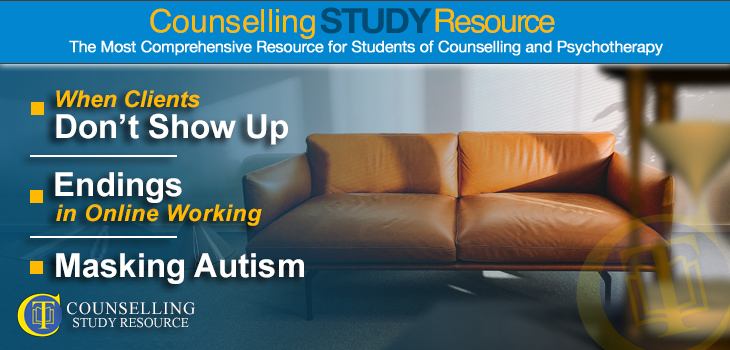177 – When Clients Don’t Show Up for Therapy
Self Psychology - Digital Presence Online
In episode 177 of the Counselling Tutor Podcast, Rory Lees-Oakes and Ken Kelly discuss the situation when clients don’t show up for therapy—or what we abbreviate as DNA (do not attend). Then, ‘Digital Counselling Revolution’ looks at how we manage and experience endings online. Finally, in ‘Practice Matters’, Rory talks with person-centred counsellor, trainer, author and doctoral student Lisa Cromar about autism-masking.
When Clients Don’t Show Up for Therapy (starts at 1.30 mins)
When clients don’t show up for therapy, this can feel very frustrating for you as the counsellor, especially if you are a student working hard to build your placement hours.
Ken and Rory provide the following tips for dealing with no-show clients:
- Try to enter the client’s frame of reference and think about what might have stopped them attending, using empathy.
- While their non-attendance may lead you to question yourself (‘Am I good enough?’, ‘What did I do wrong?’ etc.), try not to take it personally: there are many reasons for not attending that are no reflection at all on you.
- Plan for any DNAs so that you can use the time to good advantage – for example, working on an assignment, reading, practising self-care or just relaxing.
Rory has produced a handout on what to do when clients don’t show up for therapy, which you can download here.
Endings in Online Working (starts at 13.40 mins)
How we manage and experience endings is very different online from face-to-face work. When working online and by telephone, session endings can feel more abrupt.
Moreover, neither client nor counsellor has the time they might usually spend walking out of the room and building, or travelling to where they need to be next. Thus, there is less immediate opportunity to process the session.
Ken and Rory suggest:
- exploring with the client how they experience endings of your online sessions
- processing your own feelings about online endings, perhaps by journaling or speaking with peers
- discussing the issue in clinical supervision, ideally with a supervisor who has training and experience themselves in online counselling
- ensuring you cover endings during contracting, so beginning to prepare the client early
- preparing for the last session well in advance, helping to empower the client to deal with this.
Unplanned endings can be especially challenging, and the presenters direct you to episode 163 of the Counselling Tutor Podcast, in which they discussed the black-hole effect. You can also find a resource on the black-hole effect here.
You might also like to consider taking our course, Online and Telephone Counselling, which includes sections on online endings and the black-hole effect.
Masking Autism (starts at 30.00 mins)
Lisa Cromar has previously produced a lecture for Counsellor CPD on counselling autistic clients. Her latest offering on this specialist topic looks at recognising and working with autism-masking.
Lisa explains how she came to be diagnosed as autistic herself aged 37, and her particular interest since then in researching, writing about and working with autism.
Lisa and Rory talk about:
- the meaning of ‘autism-masking’
- reasons for autism-masking
- possible effects of autism-masking
- how it feels to be autistic
- how therapists can help autistic clients
- the importance of positive identity, awareness and acceptance of autism.


